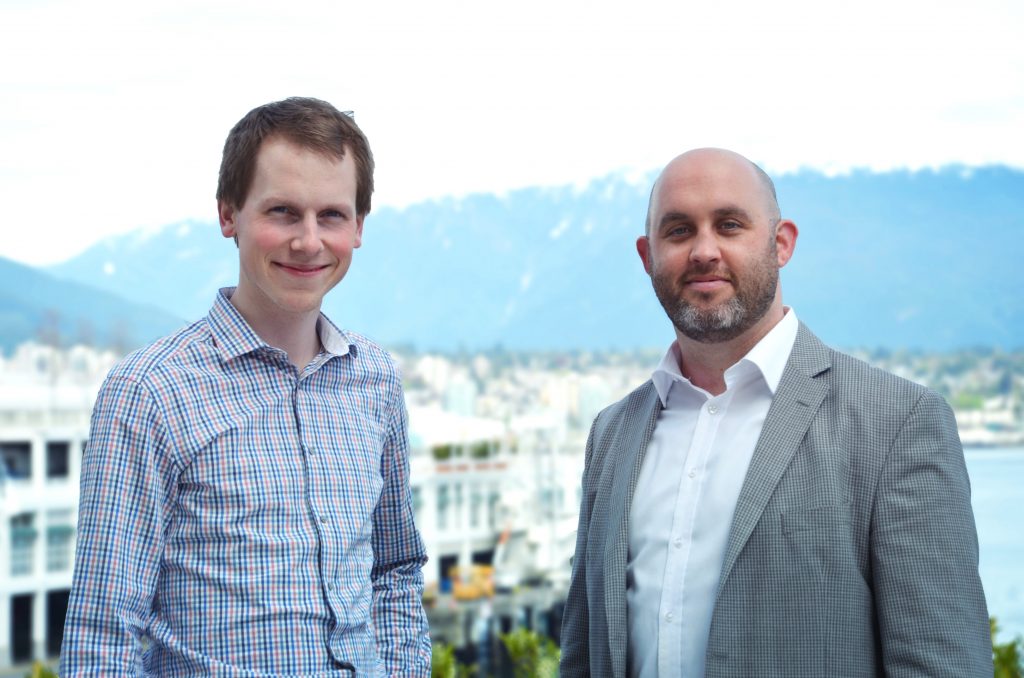Jump-starting Vancouver’s Housing and Homelessness Strategy
Jun 16, 2014

Geordan Hankinson (left) and Colin Stansfield, graduates of the MBA program at the Beedie School of Business who are now working with Ecotrust Canada and RADIUS.
Beedie grads explore viability of Social Impact Bonds to house city’s marginalized population.
The Beedie School of Business has a long history of fostering leaders who can make an impact on society. In keeping with this ethos, two graduates of the Beedie MBA program are doing just that, as they explore the feasibility of a new financial vehicle designed to scale social impact – one specifically aimed at benefiting the City of Vancouver’s Housing and Homelessness Strategy.
Geordan Hankinson and Colin Stansfield, both recent graduates of the Beedie MBA program, have been researching the viability of introducing Social Impact Bonds (SIBs) for the first time in BC. Used successfully in countries such as the UK and the US to target a variety of social issues, SIBs are a powerful new tool designed to leverage private capital for innovative social programs. They invite private investors to provide program startup financing, with governments rewarding investors only out of long-term financial savings from promised positive outcomes.
Working with RADIUS, the Beedie School of Business’ social innovation lab and venture incubator, and nonprofit organization Ecotrust Canada, and with funding from the Real Estate Foundation of BC and the Central City Foundation, Hankinson and Stansfield have produced a well received report detailing the feasibility of utilizing SIBs in Vancouver. The report, “Pay-for-Performance Partnerships: A case study in funding for Supportive Housing,” recommends the use of SIBs to help finance new housing and integrated support services for people with Severe Addiction and/or Mental Illness (SAMI).
“Social Impact Bonds are structured similarly to equity investments, but differ crucially in that they privatize risk and socialize gains – the public doesn’t pay unless targets are met,” says Stansfield. “SIBs can fund innovative programs for an interim period before they graduate into stable government funding.”
The report demonstrates how SIBs could be used to expand the scale of support systems available to the SAMI population and better align the work of Provincial Ministries, the City of Vancouver, and social service agencies, thereby reducing unsustainable demands on healthcare, policing and justice systems.
“In fiscally tight times, governments aren’t as able as they would like to take risks and open up new funding streams for innovative programs, even with clear benefits,” says Hankinson. “SIBs could provide this funding while further integrating the efforts of health, housing, and service providers, better enabling the City of Vancouver to meet the targets laid out in their Housing and Homelessness Strategy.”
The report builds on the At Home/Chez Soi study, a four-year project by the Government of Canada that sought to provide practical, meaningful support to Canadians experiencing homelessness and mental health challenges.
“Our report picks up on evidence in At Home/Chez Soi showing how certain interventions can, when successful, achieve significant public cost reductions. The challenge is that without a clear business case to substantiate those savings, it is difficult to attract private investment,” says Stansfield. “This is not just a straight philanthropic play – the investors in SIBs are looking to get a return on their investment and that requires data to encourage them.”
The report has now been presented to Provincial government and City of Vancouver officials. Should they choose to follow the recommendations, the next phase would see a variety of stakeholders discuss implementation. Hankinson and Stansfield – who both continue to work with Ecotrust and RADIUS on the initiative – are excited about the prospect of moving forward.
“The collaborative effort in phase two is a unique feature of social bonds,” says Hankinson. “Key stakeholders co-design an intervention, and investors fund the resulting program of support.”
For Hankinson and Stansfield, the experience has been a meaningful one, allowing them to utilize the knowledge gained from their Beedie education to benefit others. “It’s been a wonderful example of how the tools and skillsets learned in the Beedie MBA have allowed us to go out and make a meaningful contribution,” says Stansfield.
“It’s been fascinating discovering new ways that shared interests can be aligned to best serve a challenged population,” adds Hankinson.“This is a new approach and a new philosophy that can truly benefit people living with multiple barriers.”
Read more about Social Impact Bonds at http://ecotrust.ca/communities/socialfinance
About Developer Marketing
This is bio!
Twitter •
